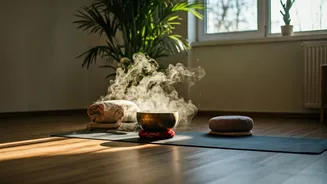Embrace Meditation & Pranayama
Meditation and Pranayama, the ancient Indian practices of breath control, are powerful tools for digital detoxification. When you immerse yourself in the world
of online distractions, your mind gets clouded, anxious, and overstimulated. Meditation helps to quiet the mind, reduce stress, and improve focus. Even a short daily practice can significantly impact your well-being. Pranayama, involving controlled breathing exercises, can calm the nervous system and increase oxygen flow, promoting relaxation and mental clarity. Incorporating these practices allows you to create space between you and your digital devices, fostering a sense of inner peace. It's about finding moments of stillness amidst the chaos, where you can reconnect with yourself and your surroundings. Remember, these techniques are not a one-time fix, but a journey of self-discovery that enables you to navigate the digital world with greater ease and resilience.
Prioritize Sleep & Healing
The quality of your sleep is crucial to a successful digital detox. When you are constantly exposed to screens, especially before bed, your body's natural sleep cycle gets disrupted. The blue light emitted by devices can interfere with melatonin production, the hormone that regulates sleep. Prioritizing sleep means creating a bedtime routine that excludes screens for at least an hour before you go to bed. This will give your body a chance to relax and prepare for sleep. Create a soothing environment conducive to rest; this may include dimming the lights, taking a warm bath, or reading a physical book. Getting adequate sleep is essential for physical and mental health. A well-rested mind and body are better equipped to handle stress, make good decisions, and resist the urge to constantly check your phone. Improving your sleep quality is a key part of your digital detox journey, as it helps you reclaim your time and energy.
Self-Time & Self-Care
Taking dedicated self-time is key to the overall success of a digital detox. Carving out time to focus on your personal well-being is vital. This could be anything from pursuing a hobby you love to simply spending quiet time alone. Self-care practices allow you to reconnect with your interests, desires, and passions. During a digital detox, you will realize how much time you are actually spending online. Instead of scrolling through social media or checking emails, use this time to engage in activities that bring you joy. This might be reading, listening to music, spending time in nature, or pursuing creative projects. This time is important for self-reflection and personal growth. By prioritizing your own needs, you can build a strong sense of self and reduce your reliance on external validation from the digital world. By scheduling regular self-time, you're investing in your long-term happiness and creating a healthier relationship with technology.
Cultivate Simple Habits
Incorporating simple habits into your daily routine can significantly enhance your digital detox efforts. These tiny yet effective changes can make a big difference in how you manage your time and attention. Start by setting boundaries around your device usage. Turn off notifications, schedule specific times for checking emails and social media, and designate screen-free zones in your home, especially the bedroom. Introduce activities like mindful eating, where you savor each bite, or deep breathing exercises throughout the day. Consider taking regular breaks from your screen. Get up and walk around every hour to stretch and rest your eyes. You could also opt for a technology-free day each week or for short periods of time. These adjustments may feel challenging at first, but with practice, they'll become second nature. It's about developing a mindful awareness of your digital consumption and proactively creating a balance that prioritizes your well-being.
Sleep Better Tonight
Having trouble falling asleep? These 4 easy tips can assist you in achieving deeper, more restful sleep every night. Firstly, establish a consistent sleep schedule; this means going to bed and waking up around the same time, even on weekends, to regulate your body's natural sleep-wake cycle. Secondly, create a relaxing bedtime routine; this might include taking a warm bath, reading a book, or listening to calming music. Avoid screen time for at least an hour before bed. Thirdly, create a sleep-friendly environment; ensure your bedroom is dark, quiet, and cool. A comfortable mattress and pillows can further aid in relaxation. Finally, watch what you eat and drink before bed. Avoid caffeine and alcohol in the evening, as they can disrupt sleep. By putting these habits into practice, you can get a better night's sleep and make your detox easier.
Yoga & Stretching Daily
Yoga and stretching are great ways to incorporate physical activity into your digital detox. Yoga and stretching help you to reduce stress, improve flexibility, and promote relaxation. A regular practice can calm the mind, relieve tension, and increase body awareness. Start with simple poses like the child's pose, downward-facing dog, or a simple twist. Stretching can be easily integrated into your daily routine. Take a few minutes to stretch at your desk, or incorporate a quick stretch session at the end of your day. Doing these easy exercises can help you reduce the physical impact of prolonged screen time. The movement helps to release tension in your neck, shoulders, and back, which is beneficial for overall well-being. Yoga and stretching also help in fostering mindfulness, allowing you to connect with your body and breath. Make a commitment to doing yoga and stretching regularly to enhance your detox experience and achieve a better state of health.












